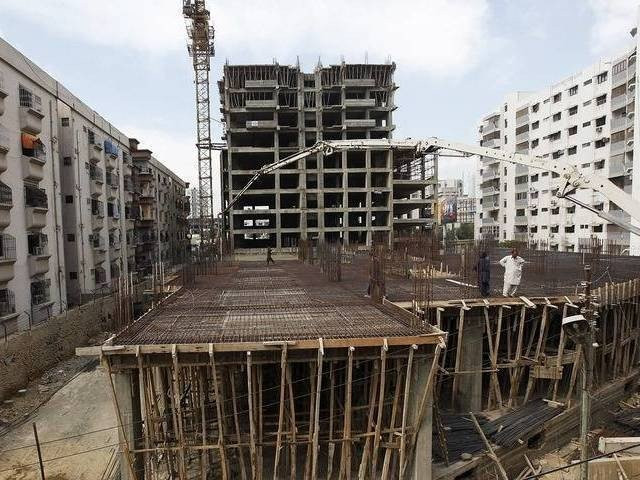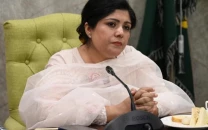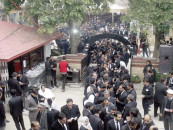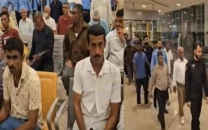Evolution of electables: How real estate developers replaced educated candidates
Over years, a new rich, corrupt but educationally backward class emerges to represent urban areas

Land grabbing in ethnically divided neighbourhoods of Karachi is a serious issue.
PHOTO:FILE
Centre left Pakistan Peoples Party (PPP) had fielded Dr Mubashar Hassan, Sheikh Muhammad Rasheed, Haneef Ramy and Malik Mairaaj Khalid from Lahore; labour leaders like Mukhtar Rana and Mian Attaullah from Faisalabad; Khursheed Hassain Mir and Malik Jaffar Advocate from Rawalpindi and Kamal Azfar, Noorul Arfeen, Abdul Hafeez Pirzada and many others from Karachi.
Known contenders from right wing religious parties were also people like Mian Tufail Muhammad from Lahore, Professor Ghafoor, Maulna Shah Ahmed Noorani, Maulana Mustafa al Azhari, Maulana Shafi Okarvi from Karachi and Maulana Mufti Mehmood from D I Khan.
As income increases, pir power wanes
The nationalist parties had also fielded politicians like Dr Abdul Hayee Baloch, Ghous Bux Bazinjo, Sardar Khair Bux Marri and Wali Khan in the contest.
Irrespective of their party platforms, almost all of those who contested the 1970 election from urban areas of West Pakistan belonged to the middle class, were highly educated, had professional background and a long political struggle to their credit.
However, almost half a century later most of those contesting from the same urban constituencies in the upcoming July 25 general election also have a common denominator.
They are affluent and a large number of them is directly or indirectly linked to the thriving real estate business. Many of them also face allegations of corruption, land grabbing and in some cases, murder.
Over these years, this new political class – which is rich, corrupt but educationally backward – has emerged to represent urban areas. This is how the politics and the society have transformed in Pakistan.
Here is a quick glance at candidates fielded by mainstream political parties in 2018. In most urban constituencies most of the candidates are attached with real estate sector or dubious businesses.
The PML-N candidate for NA-54 Islamabad, Anjum Aqeel Khan, is a real estate developer. He has been involved in misappropriation in police foundation lands. He returned Rs4 billion as a plea bargain to the National Accountability Bureau (NAB) to exonerate himself.
His opponent candidate from the PPP in this constituency, Raja Imran Ashraf is a brother of former premier Raja Pervaiz Ashraf. He is a known real estate businessman of the twin cities.
At Islamabad’s NA-52 constituency, all candidates of the mainstream parties, Dr Tariq Fazal Chaudhry of PML-N, Raja Khurram Nawaz of the PTI and Afzal Khohkar of the PPP are associated with real estate.
In Rawalpindi Senator Chaudhry Tanvir’s son Danyial Chaudhry is contesting against Sheikh Rashid at NA-62. Chaudhry Tanvir family is also known for their urban land developers business.
At provincial assembly seat PP-13, Haji Amjad is contesting on the PTI ticket. He is vice president of the biggest housing society of the country. In his nomination papers, Amjid has mentioned that he is under matric. There are eight cases pending against him in the court including one about attempted murder.
Known politician from Taxila area, Ghulam Sarwar Khan of the PTI is contesting from NA-59. His family is also into property business. There are three cases pending against him including one related to fake degree. He has mentioned stone crushing and CNG stations businesses as his sources of income.
The PML-N candidate from NA-61, Malik Abrar, is also associated with property business. He had been facing cases of land grabbing including one about alleged grabbing of a church land in Rawalpindi.
Abid Sher Ali, a former minister and a PML-N candidate for NA-103 Faisalabad, also has a transport business besides owning a property business. Another known politician from the area, Raja Riaz, who switched from the PPP to the PTI and is contesting from NA-110, also has a property business.
In Punjab’s provincial capital, Aleem Khan is the face of the PTI. He is contesting for the National Assembly’s NA-129 seat. He is a leading real estate developer of Lahore. He is also facing corruption cases and inquiries by NAB for having offshore companies.
The PML-N candidates – Ijaz Diyal from NA-128 and Afzal Khohkar from NA-136 and Rana Mubashar from NA-134 – are all known real estate tycoons from Lahore.
From Quetta the PPP had fielded Ali Madad Jhattak, a former provincial minister, for a Balochistan Assembly seat for this month’s elections. He is a leading estate businessman, who was disqualified from the contest on charges of a fake degree.
In Peshawar, many politicians are directly or indirectly associated with real estate business. A known politician of the area, Aftab Khan Sherpao, had been facing land scam cases when he was chief minister of Khyber Pakhtunkwa (K-P) then called NWFP. Haji Ghulam Ali, a relative of Maulana Fazlur Rehman, is an MMA candidate from NA-27. He is regarded an important player of real estate business in Peshawar.
There are several examples from the county’s financial capital Karachi – once known for intellectual middle class leadership – where a number of candidates in the run and leading politicians are directly linked to the real estate business or they allegedly back land mafias.
Land grabbing in ethnically divided neighbourhoods of Karachi is a serious issue. According to a rough estimate, 3,000 acres of land was developed by illegal land suppliers in the city. Land gabbing not only provides money to political parties but also enhances their vote bank, it said.
Heartland politics: Pir power in Punjab
The nexus between land and politics is important when parties lack transparent funding system. For quick money, developing housing societies and sale-purchase of land is the best place to invest if you want to avoid scrutiny. Real estate market is controlled by politicians, civil military bureaucracy, big builders and land mafia.
Analysts believe that rise of land mafia in urban areas is result of criminalised nexus of government officials, elected politicians and various business interest groups. Unlike other democratic societies, urban leadership in Pakistan could not emerge from urban local bodies institutions.
Local bodies, students and labour unions should serve as nurseries to generate urban middleclass political leadership. But local bodies in Pakistan have remained inconsistent.
Their elections were delayed both in civil and military regimes, and even when they were held, real transfer of power to the grassroots did not take place. Powerless and resource starved local bodies currently in place in the country are example of this pattern
Due to military interventions, especially after the imposition of General Ziaul Haq’s martial law, leftist political parties, civil society groups, student and labour unions were excluded from political process.
When these genuine forces were suppressed, the natural political process suffered setback. ‘Baradri’ based politics, big business groups, land developers, real estate agents and mafias filled the vacuum.



















COMMENTS
Comments are moderated and generally will be posted if they are on-topic and not abusive.
For more information, please see our Comments FAQ